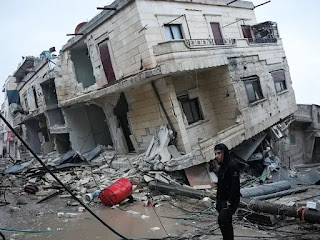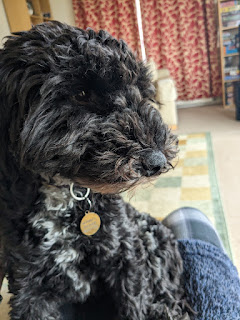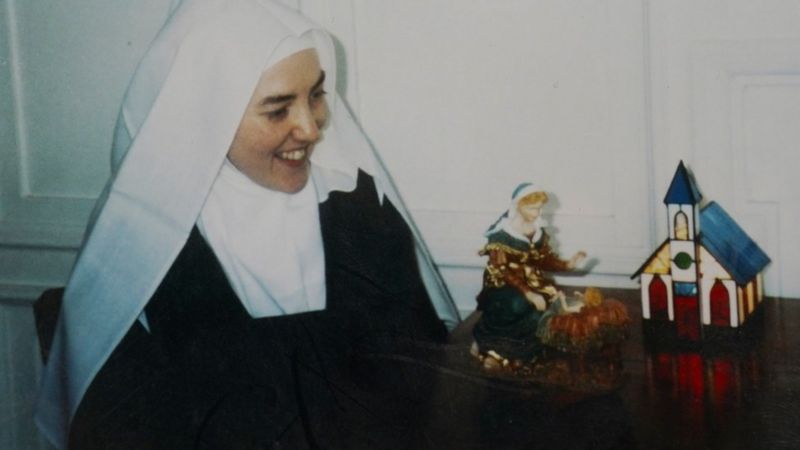I am reading Raynor Winn’s memoir, The Salt Path. Just days after she learns that her husband Moth is terminally ill, their home is taken away through circumstances they could not have really prepared for and they lose their livelihood. And their response, before the bailiffs turn up, is to pack all they can into a rucksack each and walk the 630 miles of the South West Coast Path. It’s a story of love, of loss, of endurance, and of the healing sometimes contained in just putting one foot in front of another.
So often all of our lives can be like that? We make a decision or something happens that changes the direction of our lives completely. How did I end up here? What events, joys and sorrows led me to today? How will I navigate on from here into whatever lies ahead in tomorrow.
Jesus is confronted by the chief priest and the elders and is asked by what authority he is doing these things. I pondered this for some time this week. Am I interested in talking about authority or about these things. Which of the two do the chief priests have a problem with? Possibly both! In terms of the things that the elders might have an issue with, in previous verses Jesus has cleansed the Temple, entered Jerusalem proclaimed as messiah, he’s healed the blind and demoniacs and taught with much wisdom about the nature of forgiveness and the nature of the kingdom, and he has foretold the need for his death and resurrection. These things… We can’t hear the tone in the voice of the chief priests and the elders. Going backwards from this point you have to go back to chapters 15 and 16 to hear Jesus being asked similar questions by the chief priests or elders. I wonder if there is no sneering tone in their question. Those Pharisees and chief priests are me. They are you as Junior church leaders, as choir members, as sidespeople and welcomers. These chief priests and elders are trying to help God’s people go deeper into their faith with integrity. Sure, Jesus, has harsh words about them elsewhere, but I wonder if they are trying to work out who Jesus is because they see and hear some extraordinary things done at his hands - God must be with him. So their question, I think is not one of authority - they know that God is at work - it is the things Jesus is doing, teaching and foretelling that they have an issue with. But that’s not the heart of this morning’s Gospel.
Jesus said, ‘What do you think? A man had two sons; he went to the first and said, “Son, go and work in the vineyard today.” 29He answered, “I will not”; but later he changed his mind and went. 30The father went to the second and said the same; and he answered, “I go, sir”; but he did not go. 31Which of the two did the will of his father?’ They said, ‘The first.’
There is a line in the Salt Path which has stuck with me. Raynor Winn, reflecting on what they are doing together and whether they have thought it through and she says, ‘...Do we have a plan?” “Course we do. We'll walk until we stop walking, and maybe on the way we'll find some kind of future…’ It sounds like no plan, a crazy plan. A non plan that just tries to escape the inevitability of terminal illness, of homeless, of tragedy. A non plan that will innevitably involve being confronted with all of those things and more. As the book goes on I know I will get a sense of what motivates Raynor and Moth to walk aside from avoiding the present.
In this parable, Jesus is asking similar questions in a roundabout way. Let’s do that, by noting what we don’t know. What we don’t know is if this behavior was typical of the sons or extraordinary. We don’t know what interaction or conversation the sons may have had with each other (or with their father) after their initial response. We don’t know what may have prevented (or enticed) either of the sons to act conversely to their earlier statements. And we don’t even know exactly why Jesus told this parable or why Matthew shared it.
What we do know is that the son who said he’d show up and work did not and the son who at first refused changed his mind and did. I guess you probably agree that “actions speak louder than words” and therefore believe that the first son, despite his abrupt, if not somewhat obnoxious, refusal of his father iis the one who “did the will of his father.” And we know that Jesus links this parable to the response of the tax collectors and prostitutes (shorthand for those considered beyond the pale of respectable society) to the good news of the coming kingdom.
A lot of what we don’t know has to do with motivation and circumstances, and this is true not only of our interactions with these characters but also of our interactions with each other. I don’t know what motivates many of you to come or – to not come to church. I don’t know what motivates one of you to give so generously and other who could easily do the same yet doesn’t. I don’t know what collection of experiences shape the religious and political beliefs that you hold. And so on and so on and so on.
We don’t know these things. We can have a good guess – just as we may guess about our questions related to the parable and its characters – we may make assumptions and judgments, but ultimately we don’t know. And that should introduce a modicum of caution, if not humility, in our judgments, again about these characters in the parable but even more about each other.
I wonder though whether this story of Jesus’ serves both to highlight the tension between Him and the religious authorities of his day and to build the case against those same religious leaders for their failure to answer Jesus’ question about John’s authority, their failure to accept John’s message, and their failure to recognize in Jesus as Messiah. But I wonder if this parable does also offer a word of surprise and hope.
Here are just a few. I hear in this parable the surprising possibility of hope that someone who has refused to listen to God may yet change his/her mind. Hope that it’s never too late to respond to the grace of the Gospel. Hope that one’s past actions or current status do not determine one’s future. Hope that even those whom good folk (and, lest we forget, the chief priests and elders were good folk) have decided are beyond the pale of decent society are never, ever beyond the reach of God.
If this is so, then no matter what may have happened in the past, yet God is eager to meet us in the present and offer us – indeed, secure – an open future. It is not too late. God is here, inviting each of us into the kingdom that not only lives out in front of us but has the capacity to shape our every moment from this one forth. This is something, I think, of what Paul Tillich meant with his phrase “the eternal now.” Each moment is pregnant with the possibility of receiving God’s grace, repenting of things we’ve done or were done to us, returning to right relationship with God and those around us, and receiving the future as open rather than determined. Like Raynor and Moth - all we need to do is walk into that future.
Friends, God’s promise about an open future shapes our present here and now. Friends, hear that - God’s promise about an open future shapes our present here and now, but to begin to grasp that we each need to look inside ourselves for those things that are holding us back from receiving God’s promises. What things do we hold onto that make it difficult to believe and accept God’s forgiveness or to imagine that the future can be different than the past? We also need to look around us - there are some here who will vote Conservative and some Labour or Lib Dem. Brexiteers and Sceptics. There will be some here delighted at Watford or indeed even Preston’s losses yesterday, and some not, people who are optimistic about the future and those who are frightened, people who feel great about our the direction of travel of the Church of England in trying to prepare prayers to be used with faithful loving same-sex married couple and those who don’t, and so on. Look, I don’t know your motivations or experiences or you mine, but we do know that God is reaching out to each one of us this morning with the gift of acceptance and love and forgiveness that are the hallmarks of the kingdom Jesus proclaims.
We live at time of division. And without for a moment undervaluing the important values, beliefs, and concerns that underlie some of those divisions internationally, nationally and ecclesiastically but beneath all of those differences is a profound commonality - we are each a child of God whom God loves, adores, and is speaking to right here and now. And being reminded of that might we take a little more time to listen to each other, try to understand each other, and try to listen for God’s calling for ourselves and our community together, instead of isolation? That I believe is John’s way of righteousness - recognising that the path that we are on may not be the right future for us or each other, turning around, and walking back towards God and each other?















.jpg?format=2500w)